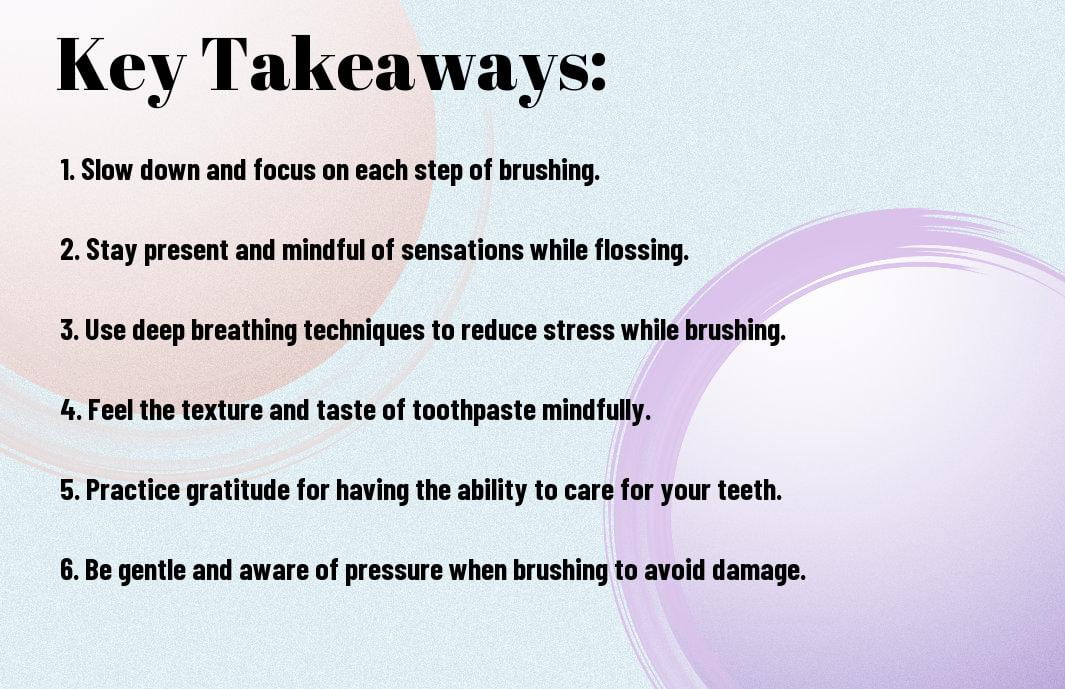In terms of maintaining a healthy smile, a routine oral care regimen is crucial. However, many people overlook the importance of mindfulness in their daily dental hygiene practices. By incorporating mindfulness into your oral care routine, you can improve your overall dental health and well-being. Being mindful while brushing and flossing allows you to focus on the present moment, ensuring that you are properly caring for your teeth and gums. This can help prevent cavities, gum disease, and other dental issues that may arise from inadequate oral hygiene. So, let’s explore how you can bring mindfulness into your daily oral care routine for a healthier smile.
Key Takeaways:
- Mindfulness can improve oral health: Practicing mindfulness techniques such as deep breathing and being present can help reduce stress, which in turn can lower inflammation in the body including the gums.
- Use mindfulness during oral care routines: By focusing on each step of your oral care routine, you can ensure that you are thoroughly cleaning your teeth and gums, reducing the risk of plaque build-up, cavities, and gum disease.
- Mindfulness promotes overall well-being: Incorporating mindfulness into your oral care routine can have both dental and overall health benefits, leading to a healthier mouth and a more relaxed state of mind.
The Mindful Oral Care Approach
Even the simplest daily routines can be transformed into mindful practices, including oral care. The mindful oral care approach involves being fully present and aware during your oral hygiene routine, which can lead to a deeper connection with yourself and improved overall well-being.
Benefits of Mindful Oral Hygiene
Oral hygiene is not just about brushing and flossing; it’s about taking the time to carefully and intentionally attend to your oral health. By incorporating mindfulness into your oral care routine, you can reduce stress and anxiety, improve focus and concentration, and even enhance your overall dental health. Mindful brushing and flossing can also help you develop a greater awareness of your body and any tension you may be carrying.
By being present and attentive while caring for your teeth and gums, you may also become more mindful of your eating habits and overall self-care practices. Taking the time to practice mindful oral hygiene can have a positive ripple effect on your entire well-being, promoting a sense of balance and harmony in your daily life.
Techniques for Incorporating Mindfulness
For those looking to incorporate mindfulness into their oral care routine, there are several techniques to try. Begin by pausing before you start brushing or flossing to take a few deep breaths and center yourself in the moment. Focus on the sensations and movements involved in cleaning your teeth, being fully present with each action.
Another technique is to practice mindful awareness of any thoughts or distractions that arise during your oral care routine. Instead of trying to push these thoughts away, acknowledge them non-judgmentally and gently guide your focus back to the task at hand. This practice can help you cultivate a sense of calm and clarity in your daily oral care rituals.
Any individual can benefit from incorporating mindfulness into their oral care routine, regardless of age or background. Mindful oral hygiene is a simple yet powerful way to nurture your mind-body connection and promote overall wellness in your daily life.
Mindful Brushing Routines
Establishing a Mindful Brushing Habit
Keep consistency in mind when establishing a mindful brushing habit. Choose a specific time of day to brush your teeth, such as after breakfast or before bed, and stick to this routine every day. This will help your mind associate the activity with a specific trigger, making it easier to remember.
An effective way to incorporate mindfulness into your brushing routine is to start with setting an intention. Before you begin, take a moment to focus on the present moment and your intention for brushing your teeth. This could be maintaining good oral health, keeping your breath fresh, or simply taking care of yourself.
Mindful Brushing Step-by-Step
One
One important aspect of mindful brushing is to pay attention to the pressure you are applying. Use gentle, circular motions to clean each tooth thoroughly. Avoid scrubbing too hard, as this can damage your gums and enamel. Remember to also brush the surfaces of your tongue and roof of your mouth to eliminate bacteria and keep your breath fresh.
Brushing your teeth mindfully allows you to connect with the present moment and focus on the task at hand. By paying attention to the sensations, movements, and thoughts that arise during brushing, you can cultivate a sense of calm and awareness in your daily routine. This not only enhances your oral care but also promotes overall well-being.
Mindful Flossing and Beyond
After practicing mindful brushing, it’s time to investigate into the world of mindful flossing and other oral care practices.
The Role of Flossing in Mindful Oral Care
Flossing is a crucial part of a mindful oral care routine. It helps remove food particles and plaque from between the teeth and along the gumline, where your toothbrush may not reach. One way to practice mindful flossing is to focus on the sensation and sound of the floss gliding between each tooth. By bringing your full attention to the task at hand, you can ensure a thorough clean and promote gum health.
One technique to incorporate mindfulness into flossing is to set an intention before starting. Take a moment to center yourself and focus on the present moment. As you floss, be mindful of any tension in your jaw or hands, and consciously relax those areas. Pay attention to any discomfort or bleeding, which could indicate inflammation or gum disease that needs addressing. By being fully present during flossing, you can enhance the effectiveness of your oral care routine and cultivate mindfulness in your daily habits.
Additional Mindful Oral Care Practices
Oral care goes beyond brushing and flossing; there are additional practices you can incorporate into your routine to promote overall oral health. For instance, tongue scraping is a mindful practice that involves gently scraping the tongue to remove bacteria and toxins that can contribute to bad breath and poor oral health. This simple yet effective practice can improve your sense of taste and promote overall oral hygiene.
Another mindful oral care practice is oil pulling, an ancient technique that involves swishing oil in your mouth to remove toxins and bacteria. Coconut oil is a popular choice for oil pulling due to its antimicrobial properties. Regular oil pulling can help reduce oral bacteria, prevent plaque buildup, and promote healthy gums. By incorporating these additional practices into your oral care routine, you can take your mindfulness to the next level and enhance your overall oral health.
Challenges and Solutions
Once again, let’s probe into the world of mindfulness and oral care. Incorporating mindfulness into your daily routine can be transformative for your overall well-being, but it also comes with its own set of challenges. Understanding these obstacles and finding effective solutions is key to making mindfulness a sustainable part of your oral care regimen.
Common Obstacles in Mindful Oral Care
The fast-paced nature of modern life can often impede our ability to be fully present in the moment, including during our oral care routine. Distractions, such as smartphones or racing thoughts, can make it difficult to focus on the task at hand. Additionally, the monotony of brushing and flossing can lead to mindless repetition, diminishing the potential benefits of a mindful practice.
Furthermore, feelings of impatience or discomfort may arise when attempting to slow down and pay attention to the sensations involved in oral care. This discomfort can manifest as a desire to rush through the routine or avoid it altogether. These challenges can hinder our ability to engage fully with our oral care practices and reap the rewards of a mindful approach.
Strategies for Overcoming Challenges
Challenges in mindful oral care are common, but there are effective strategies to overcome them. One approach is to create a dedicated space and time for your oral care routine, free from distractions. This can help you focus solely on the task at hand and cultivate a sense of presence and awareness. Additionally, incorporating mindfulness techniques, such as deep breathing or body scan exercises, can help anchor you in the present moment and enhance the experience of oral care.
Another useful strategy is to infuse intentionality into your oral care practices. By setting specific intentions, such as promoting oral health or cultivating gratitude for your teeth and gums, you can imbue your routine with purpose and meaning. This shift in mindset can transform your oral care routine from a mundane task into a mindful ritual that nourishes both your body and mind.
Any individual can face challenges when integrating mindfulness into their oral care routine. By acknowledging these obstacles and implementing targeted strategies, you can cultivate a more mindful approach to oral care that supports your overall well-being. Note, consistency and patience are key as you navigate this journey toward a more mindful and fulfilling oral care routine.
To wrap up
On the whole, incorporating mindfulness into your oral care routine can have numerous benefits for both your dental health and overall well-being. By being present and focused during activities such as toothbrushing, you can reduce stress, improve your oral hygiene, and promote a sense of calmness. To learn more about incorporating mindfulness into your daily routine, check out Mindful toothbrushing: a quick way to add mindfulness to your daily routine.
FAQ
Q: Why should I incorporate mindfulness into my oral care routine?
A: Practicing mindfulness can help you become more aware of your oral care habits, leading to better oral health. By staying present and focused while brushing and flossing, you can ensure that you are being thorough and effective in your routine.
Q: How can I be more mindful during my oral care routine?
A: To incorporate mindfulness into your oral care routine, start by taking a few deep breaths before you begin. Focus on the sensations and movements involved in brushing and flossing. Pay attention to each tooth as you clean it, being fully present in the moment.
Q: What are the benefits of mindfulness for oral health?
A: Mindfulness can help reduce stress, which is linked to oral health issues such as gum disease and teeth grinding. By being mindful during your oral care routine, you can also improve your overall well-being and reduce the risk of dental problems caused by poor oral hygiene habits.







